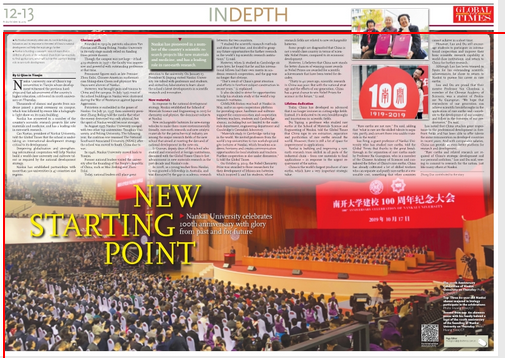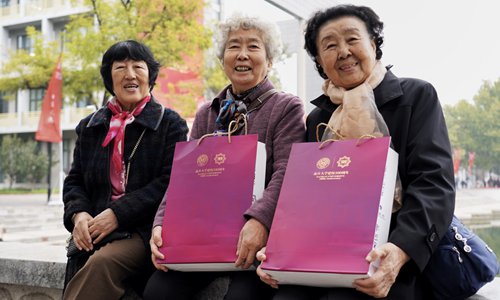Nankai University Celebrates 100th anniversary with glory from past and for future Global Times (2019-10-18 P12-13) By By Li Qiao in Tianjin

the 100th anniversary celebration of nankai university on thursday Photo:li Qiao/GT
○ As Nankai University celebrates its 100th birthday, globalization and its response to the need of China's national development will help the institute go further ○ Nankai is building a rare-earth research team that is skilled in all parts of the industrial chain from raw materials to final applications, which will bolster the country's leading role in rare-earth development Nankai University, one of China's top universities in Tianjin whose development witnessed the previous hardships and fast advancement of the country's higher education, celebrated its 100th anniversary on Thursday.
Thousands of alumni and guests from academe joined a grand ceremony on campus, which was followed by events like a holographic light show on its main building.
Nankai has pioneered in a number of the country's scientific research projects like new materials and medicine, and has a leading role in rare-earth research.
Cao Xuetao, president of Nankai University, told the Global Times that the school is undertaking an international development strategy critical to its development.
Deepening globalization and strengthening international cooperation will help Nankai build a world-class university and cultivate talent as required by the national development strategy.
Nankai has established partnerships with more than 320 universities in 47 countries and regions.

three 80-year-old nankai alumni who majored in biology Photo:Huang Yiran/GT
Glorious path Founded in 1919 by patriotic educators Yan Fansun and Zhang Boling, Nankai University in its early stage mainly relied on funding from private donors.
Though the campus was not large - it had 429 students in 1937 - the faculty was impressive and powerful with outstanding professors at that time.
Prominent figures such as late Premier Zhou Enlai, Chinese-American mathematician Shiing-shen Chern and physicist Wu Dayu were alumni of Nankai.
However, war brought pain and trauma to China and the campus. In July 1937, most of the school buildings in Nankai were destroyed during the War of Resistance against Japanese Aggression.
Patriotism is embedded in the genes of Nankai. On July 30, 1937, then university president Zhang Boling told the media that what the enemy destroyed was only physical, but the spirit of Nankai would become stronger.
In August 1937, Nankai University merged with two other top universities: Tsinghua University and Peking University. The following year, the coalition was renamed The National Southwest Associated University (NSAU) after the school was moved to South China due to war.
In 1946, Nankai University moved back to Tianjin.
Former national leaders visited the university after the founding of the People's Republic of China, such as Mao Zedong and Zhou Enlai.
Today, national leaders still place great attention to the university. On January 17, President Xi Jinping visited Nankai University. He talked with professors and students, and visited key laboratories to learn about the school's latest developments in scientific research and innovation.

An alumnus poses with his family behind a logo of the 100th anniversary of the founding of Nankai University on Thursday Photo:Huang Yiran/GT
New materials In response to the national development strategy, Nankai established the School of Materials Science and Engineering in 2015 for chemistry and physics, the dominant subjects at Nankai. New rechargeable batteries for new-energy vehicles to make them more environmentally friendly, rare-earth research and new catalytic materials for the petrochemical industry are among the major research fields of the new school that aimed at meeting the demand of national development in the new era. Li Guoran, deputy dean of the school who studied and researched at foreign institutions, discussed with the Global Times China's fast advancement in new materials research in the past decade and Nankai's role. In 2008, as a young teacher from Nankai, Li was granted a fellowship in Australia, and was dismayed by the gap in academic research between the two countries. "I studied the scientific research methods and ideas at that time, and decided to grasp any future opportunities for further research in the world's top scientific research institutions," Li said. However, when Li studied in Cambridge six years later, he found that he and his international fellows had their own merits in academic research cooperation, and the gap was no longer that obvious. "That's result of China's great attention and efforts in forefront subject construction in recent years," Li explained. Li also decided to strive for opportunities to help his students study at the world's top research institutes. CAMLiNK-Station was built at Nankai in May, and is an open cooperation platform for providing space, hardware and software support for communication and cooperation between teachers, students and Cambridge alumni, including but not limited to the materials department, engineering department and Cambridge's Cavendish laboratory. "Materials study in Cambridge ranks top in the world. We invited professors from the world's top universities to run workshops and give lectures at Nankai, which broadens academic horizons and creates communication opportunities for local students and teachers. Further cooperation is also under discussion," Li told the Global Times. On October 9, 2019, the Nobel Chemistry Prize was awarded to three researchers for their development of lithium-ion batteries, which inspired Li and his students, whose research fields are related to new rechargeable batteries. Some people are disgruntled that China is not a world-class country in terms of scientific Nobel Prizes, compared to its economic development. However, Li believes that China now stands for better chances of winning more awards as Nobel Prizes are awarded for scientific achievements that have been tested for decades. "Thirty to 40 years ago, scientific research in China was poor. But with the national strategy and the efforts of our generation, China has a great chance to win Nobel Prizes for science in the future," Li said. Lifetime dedication Today, China has developed so advanced that it no longer imitates in cutting-edge fields. Instead, it's dedicated to its own breakthroughs and innovations in scientific fields.
Du Yaping, a professor who studied rare earths at the School of Materials Science and Engineering of Nankai, told the Global Times that China tops in ore extraction, separation and purification of rare earths around the world. However, there is still a lot of space for improvement in applications.
Nankai is building and improving a rare-earth research team skilled in all parts of the industrial chain - from raw materials to final applications - in response to the urgent requirement of the nation.
China is the world's largest producer of rare earths, which have a very important strategic value.
"Rare earths are not rare," Du said, adding that "what is rare are the skilled talents to separate, purify, and convert them into usable materials in the world."
Luo Feng, a guest professor of Nankai University who has studied rare earths, told the Global Times that thanks to the great breakthrough in the separation of rare earths made by Professor Xu Guangxian, who is a member of the Chinese Academy of Sciences and considered the father of China's rare earths, China has already cultivated a lot of skilled workers who can separate and purify rare earths at a reasonable cost, something that other countries cannot achieve in a short time.
However, Luo and Du still encourage students to participate in international cooperation and improve their basic scientific research capability at world-class institutions, and return to China for further research.
Although Luo has been tenured in Spain for his outstanding scientific achievements, he chose to return to Nankai to pursue his career in rare earths.
Luo and Du are proud that their mentor Professor Yan Chunhua, a member of the Chinese Academy of Sciences, was a student of Professor Xu Guangxian. "We hope that researchers of our generation can achieve scientific breakthroughs in the application of rare earths and contribute to the development of our country, and follow in the footsteps of our predecessors," Du said.
Luo noted that China attaches great importance to the professional development in forefront fields and has been able to offer talents the same remuneration as developed countries in recent years. And with comparable salaries, China can provide an even better platform for research and development.
"Rare earths and related research are required of China's strategic development and our personal ambition," Luo and Du said, vowing to commit to research for the nation, just like many others at Nankai.
Zhang Dan contributed to the story |